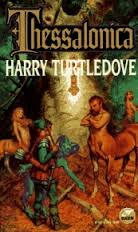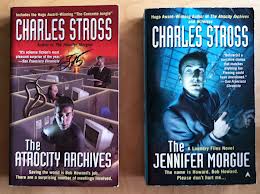This alternate history, Thessalonica, recounts how George, a simple shoemaker who lives in Thessalonica in the 7th century A.D., attempts to rescue his home city from historical invaders. George is a Christian, as are most of the city’s residents, but remnants of the old pagan religion and its creatures are known to still exist in the hills. George happens upon a satyr, who warns him of a new danger approaching Thessalonica. The danger turns out to be the invading Avars and Slavs, who have at their command bats with gleaming red eyes who dive on the soldiers who patrol the city walls and giant wolves whose howls chill the souls of the besieged. Rumors of worse threats abound as well, such as the fire goddess the invaders can summon. Even the satyr, nymphs, centaurs, and other remnants of the Greek pantheon lurking in the mountains around Thessalonica are frightened.
Within days the city is surrounded, and though the strength of their Christian God enables the population to keep the warriors at bay, George realizes they may need additional help to finally defeat their enemy. With the help of the pious Priest Luke, George convinces the satyrs and centaurs to come to the aide of Thessalonica.
This alternate history of the Byzantine Christian interaction with the Slavs and other pagans of the 7th century is wonderfully written and I am happy to recommend it!



